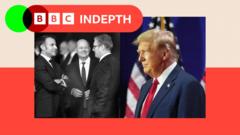European leaders are bracing for a complex relationship with Donald Trump amid their own internal struggles, highlighting the adaptation needed for a stable transatlantic alliance.
Trump's Return: Europe's Changing Landscape and Challenges Ahead

Trump's Return: Europe's Changing Landscape and Challenges Ahead
As Europe anticipates the possibility of Trump’s second term, leaders reflect on vulnerabilities and potential shifts in transatlantic relations.
With the US general election looming and Donald Trump back in the spotlight, European nations find themselves at a crossroads. The concerns range from Trump's combative approach to alliances, particularly with NATO, to the challenges posed by a stagnant economy in countries like Germany and France. Iris Mühler, an engineering teacher in Germany, laments the fixation of her country’s news outlets on Trump despite pressing domestic issues, illustrating a widespread sentiment.
Many European leaders remember the tumultuous relationship under Trump's first term, fearing that a second could present even harsher realities. Tensions over trade and defense have resurfaced, with Trump maintaining a transactional outlook rather than honoring long-standing partnerships. Observers note Trump's critical view of NATO, threatening the alliance's cohesion by suggesting that he could reduce US support unless Europeans increase their spending. Furthermore, he has threatened blanket tariffs on EU goods, significantly impacting Germany's export-driven economy.
Ian Bond, a noted political analyst, emphasizes that Trump's past animosity toward Germany might re-emerge, which could complicate matters for Berlin, especially if populist parties gain traction in the upcoming elections. Similarly, the UK faces uncertainty as it navigates its position amid potential US tariffs while hoping to minimize their impact during a possible EU-US trade war.
Adding to the complexity, Trump's relationship with tech magnates like Elon Musk creates a layer of unpredictability. Musk’s controversial opinions, favoring hard-line politics, have stirred concerns among European leaders who recognize the challenging dynamics of US social media influence on European affairs.
Despite this, various approaches are being considered across Europe to mitigate potential fallout. French President Emmanuel Macron’s strategy centers on engagement and flattery, having swiftly congratulated Trump after his election and previously impressing him with ceremonial gestures. On the other hand, leaders like Christine Lagarde of the European Central Bank recommend negotiating rather than retaliating against Trump’s trade threats, showcasing a diverse array of tactics as concerns grow over Trump's potential policies.
Of particular importance is the overarching question of European defense. While Europe acknowledges the necessity for increased military expenditure, leaders are debating the best strategies for unified spending. Macron advocates for a cohesive industrial defense policy, stressing that fragmentation weakens their position in global politics and defense.
As Europe grapples with these issues, the interplay of internal politics, economic revitalization, and leadership responses to Trump’s return will shape the continent's future. The narrative of Trump and Europe is yet to be rewritten, but uncertainty looms as leaders prepare for a tumultuous relationship against a backdrop of historical tensions and evolving challenges.






















